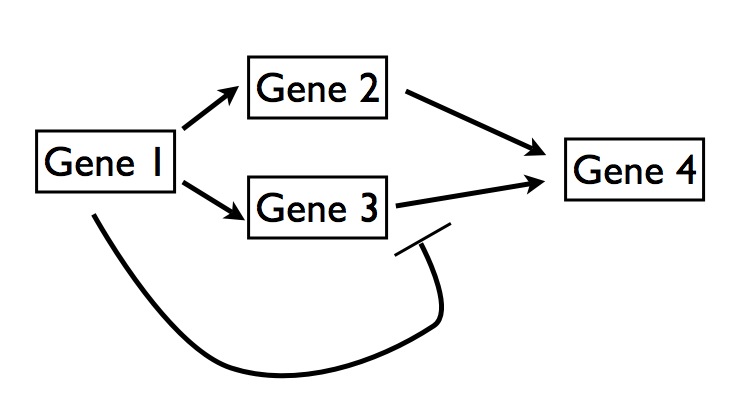We like to talk about the amazingly complex machinery of the cell: flagella that resemble finely tuned outboard motors, or complex information processing circuits that help a cell process information about its environment. Biologists work hard at understanding how these systems work. They will take a wiring diagram like the following, and ask why is it set up this way? What is the function of this circuit?

(Side note: This genetic circuit, taken from an example involved in yeast cell division, involves both genes and transcription factor proteins, but for semantic simplicity, I'm just calling them all genes.)
Here's how to read this diagram: arrowheads indicate one gene activating another; a bar instead of an arrowhead means one gene is
inhibiting another. Basically what's going on here is that Gene 4 has to get turned on at the right time by Gene 2, which is turned on by Gene 1. But Gene 1 also turns on Gene 3, which can switch on Gene 4, but for some perverse reason, isn't supposed to, so Gene 1 ends up both activating and inhibiting Gene 4.
Why is this set up this way? Sometimes we have to remind ourselves that in some instances there is no purpose to all of this complexity. Sometimes a genetic circuit, while it may get the job done, has no deep functional purpose for its structure - that structure is an artifact of evolutionary history.
In this case, I gave you an example from a small genetic circuit involved in yeast cell division. The excessive complexity of this particular circuit is underscored by a parallel circuit (in fact, a homologous one, formed by gene duplication, serving essentially the same function) which achieves the exact same result in a much more simple way:

If you're reverse engineering a human designed engine, you can legitimately ask "What did the engineer have in mind by designing things this particular way?" In biology we don't have that particular luxury - a design may have a specific functional purpose, or it may not, and an alternative could be just as good.
Evolutionary biologist Michael Lynch rather bluntly, if not combatively,
makes the same point (free full text), not about genetic circuits, but about the complexity in our genomes:
"Emergent biological features such as complexity, modularity, and evolvability, all of which are current targets of considerable speculation, may be nothing more than indirect by-products of processes operating at lower levels of organization."
Lynch argues that much of the complex structure of the genomes of multicellular organisms (compared with the more simple genomes of single-celled organisms) arises not because it's useful, but because it can't be avoided given the underlying population genetics.
This is one reason biology is so hard. Reverse engineering complex systems is hard enough, but the sheer, cussed contingency in biology can really throw a wrench in the works.




Comments